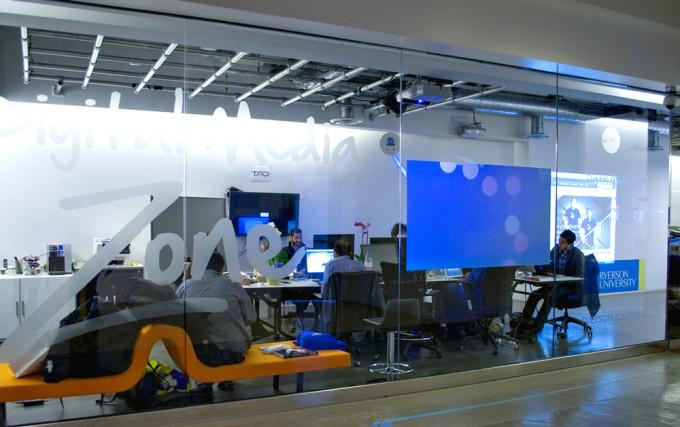By Jeff Lagerquist
The fourth annual Battle on Bay Street Case Competition Conference brought a taste of real-world, handwringing, suit-squirming pressure to the Ted Rogers School of Management (TRSM) last Friday. The event saw eight teams from seven universities compete against one another in a test of business acumen, public speaking, and time management.
The hypothetical case challenge involved a small web solutions company looking to strike a deal with a venture capital firm. The Mom and Pop, brick and mortar operation needed cash to stay in business, but getting in bed with the venture capital firm meant that current owners would lose majority control of a company they built over many years.
“It’s a real-world scenario, not a textbook problem. There is no absolute right answer,” said Ryan Madeley, the director of the Case Competition for the Ryerson University Finance Society.
Teddy Ghalustians, Kyle Priest, and Daniel Smith, all in fourth-year finance, represented Ryerson. They acted as consultants for the small business, reviewing the terms of the deal, making recommendations and preparing a counter proposal.
Each team was given just three hours to iron out a favourable deal that secured the much needed cash infusion and allowed the current owners to hold onto as much of their company as possible.
Madeley hand delivers a seal envelope containing the case outline and a 30-page “term sheet” that outlines the complex stipulations of the venture capital firm’s offer to the team’s small conference room in the TRSM building. The clock starts as soon as they tear open their challenge package.
“It’s critical to have a game plan and be prepared mentally. Every second counts. You only have three hours so it’s about how each member is going to allocate their time,” said Ghalustians.
Case competition teams are carefully selected. Like any team at Ryerson, every member has a specialized role to play. Ghalustians has strong evaluation skills, while Smith can quickly put together a slick PowerPoint presentation.
After three hours of working against the clock, the teams presented a five-minute PowerPoint presentation to a panel of four industry expert judges, followed by a five-minute question and answer session.
“Time management was one thing that we did very well. We had enough time to do the case, make a very nice presentation, and actually do one or two dry runs,” said Ghalustians.
The judging panel starts to scrutinize the team the moment they enter the boardroom. All eight teams are named after business icons like Warren Buffett to prevent the judges from favouring their alma mater.
Chad Tennant, one of four judges and a Ryerson commerce graduate, says appearance, confidence, and clarity are often just as important as having the right answer.
“There were some groups that didn’t even introduce themselves. You didn’t know who was who,” said Tennant, now the managing director at Brevity Management Group.
Ryerson placed second, after Concordia University, but managed to edge out the Richard Ivey School of Business based at the University of Western Ontario, a program known for case-focused training.
“The Ryerson guys were amazing. They had a lot of passion, a lot of enthusiasm, and a wonderful presentation in terms of flow and structure,” said Tennant. “The sooner you understand how to dissect a case and apply critical thinking and analysis, the better you are in the real world.”
While TRSM courses like BUS 800 offer both individual and group case analysis projects, many students feel they would benefit from more casebased evaluation in the classroom.
“Ivey built it into their curriculum. We practiced eight to 10 Ivey cases we bought from their database, but it’s more of an extra curricular thing,” said Priest. “The Ivey kids that graduate have done 500 cases in the time they’ve been at school,” said Priest.












Leave a Reply